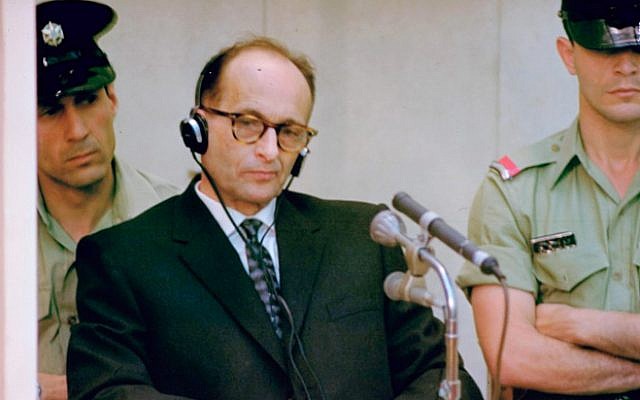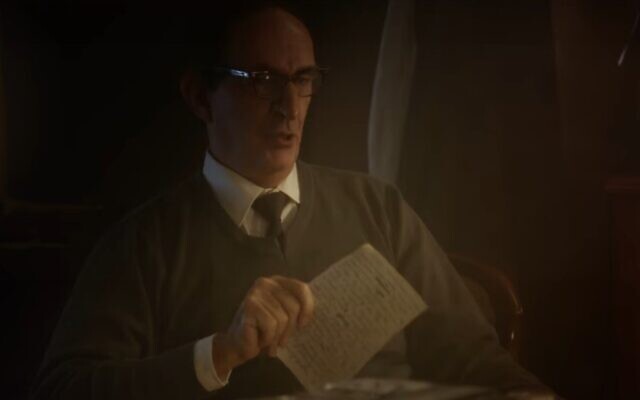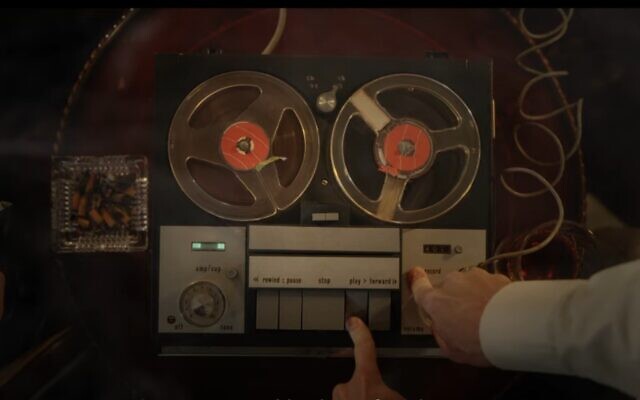 New film brings Eichmann’s Holocaust confessions to life using his own voice
New film brings Eichmann’s Holocaust confessions to life using his own voice
STUART WINER
Original recordings are dubbed over actors portraying senior Nazi figure and his interviewer before Israel put him on trial; he expresses pride in genocide, says has no regrets
 Adolf Eichmann during his trial in Jerusalem (public domain)
Adolf Eichmann during his trial in Jerusalem (public domain)
Convicted Nazi war criminal Adolf Eichmann is heard but not seen in a new film as an actor mouths the words he used over 60 years ago to describe his key role in the Holocaust.
Eichmann, a key architect of Nazi Germany’s Final Solution, went into hiding after the war and was snatched from Argentina by Israeli intelligence in May 1960 to be put on trial in Jerusalem. Israel executed the top Nazi official by hanging in 1962 for his role in the mass murder of six million Jews.
Four years before he was captured, Eichmann gave hours of interviews to Dutch Nazi journalist Willem Sassen at the reporter’s home in Argentina. Sassen was one of many Nazis who also fled to the South American country after the war.
The recordings include remarks attributed to Eichmann that prosecutors presented at the trial, but that he denied at the time, including his clear declaration of having no regrets about the mass murder and even an expression of disappointment that millions more Jews were not killed.
Eichmann claimed in his defense during the trial that he was just a minor bureaucrat.
“In conclusion, I must say to you… I regret nothing. I have no desire to say that we did something wrong,” Eichmann said in the recordings.
“If we had killed 10.3 million Jews I would say with satisfaction ‘Good, we destroyed an enemy.’ Then we would have fulfilled our mission. And thus, to my regret, it was not to be,’” Eichmann is heard saying in parts of the recordings that feature in the film and in which he was apparently referring to the entire Jewish population of Europe on the eve of the Holocaust.
Actor Eli Gorenstein plays Eichmann in scenes in “The Devil’s Confession: The Lost Eichmann Tapes” that recreate the interview in which Eichmann described to Sassen and others how the Holocaust occurred.
To maintain an element of authenticity, while the actors mouth the exact words Eichmann and Sassen used, it is the original voices from the recordings that are heard on the soundtrack.
 Screen capture from video of Israeli actor Eli Gorenstein as Nazi war criminal Adolf Eichmann in ‘The Devil’s Confession: The Lost Eichmann Tapes.’ (YouTube)
Screen capture from video of Israeli actor Eli Gorenstein as Nazi war criminal Adolf Eichmann in ‘The Devil’s Confession: The Lost Eichmann Tapes.’ (YouTube)
Sassen had proposed to Eichmann that he write his life story, and they conducted some 70 hours of interviews over six months.
As word of the sessions spread among the expat Nazis in the area, some came to the Sassen home to participate and hear, firsthand, about the Holocaust, producer Yariv Mozer told Channel 12 News.
According to Mozer, many of the other Nazis found it hard to comprehend that six million Jews were really killed, believing that it was a lie made up by the Jews themselves. The recordings captured their astonishment at being told that it was true.
In a recording, one of those present can be heard saying “It can’t be done, it can’t be.”
At that point, the recording machine was apparently stopped and only restarted later.
Sassen carefully transcribed all of the recordings and gave them to Eichmann for review, with the latter occasionally adding handwritten notes.
Eichmann was aware of the significance of what he was putting on the record and is heard instructing Sassen that the content must only be used for research and only be published after his death.
However, after Eichmann’s capture by the Mossad spy agency and his transfer to Israel, Sassen sold a story to Life, an American magazine. An article based on the interviews was published on November 28, 1960, with the title “I transported them to the butcher” and the byline “Adolf Eichmann.”
Weeks before Eichmann’s trial opened, a copy of the magazine was sent to the Israel Police, which still has it its archives. Six months into the trial itself, 700 pages of transcripts from the recordings were sent to Israeli prosecutors who used some of the material, though the court only accepted the pages that had Eichmann’s handwritten notes on them. It is not clear who had mailed the magazine or the transcripts to Israeli authorities.
 Screen capture from video from the documentary film ‘The Devil’s Confession: The Lost Eichmann Tapes.’ (YouTube)
Screen capture from video from the documentary film ‘The Devil’s Confession: The Lost Eichmann Tapes.’ (YouTube)
Eichmann rejected quotes from the transcripts — including some from the Life article — saying he needed to review the original recordings, which were not held by the prosecution. The Life magazine, he said, was quoting him out of context.
But, at the time, the original recordings were hidden.
Sassner had at first buried them at a secret location and then later handed them over to the Eichmann family, from where they eventually ended up at the German national archive in the city of Koblenz.
Tami Revah Hausner told the Kan public broadcaster that her father, Gideon Hausner, had “very much wanted to get his hands on the recordings.”
“If he had the sounds, the job would have been much easier,” she said. Hausner died in 1990.
A three-part series about the recordings will be broadcast on Kan starting June 7.
“The Devil’s Confession: The Lost Eichmann Tapes” is scheduled to be shown at the DocAviv Film Festival in Tel Aviv on May 29, where it is entered in the Israeli documentary competition.
It was made jointly by MGM and Tadmor Entertainment, with support from the Kan public broadcaster.
Jessica Steinberg contributed to this report.
Zawartość publikowanych artykułów i materiałów nie reprezentuje poglądów ani opinii Reunion’68,
ani też webmastera Blogu Reunion’68, chyba ze jest to wyraźnie zaznaczone.
Twoje uwagi, linki, własne artykuły lub wiadomości prześlij na adres:
webmaster@reunion68.com
